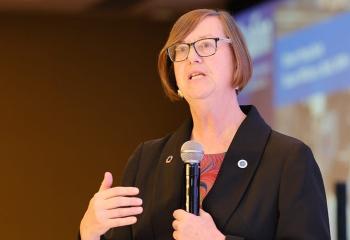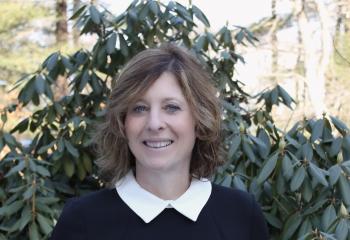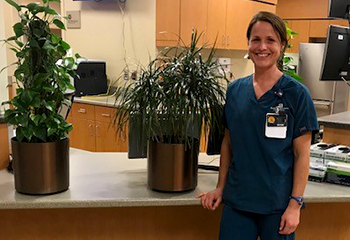“In my work with seniors, I’ve had to explain to them why they shouldn’t go outside and exercise. Because of rising temperatures and air pollution, the onset of asthma among our seniors has grown exponentially. It affects what they can do and negatively impacts their quality of life.”
—
As a public health nurse in San Antonio, Adelita Cantu has seen firsthand how the environment affects the most vulnerable members of her community. For four decades, she has worked with various county health departments on a range of programs, from providing prenatal care to low-income mothers to conducting health visits with the elderly.
“I chose to work in the community, as this is where people take care of their health and where I find I can have the most impact,” Cantu said. “In my work with seniors in San Antonio, I’ve had to explain to them why they shouldn’t go outside and exercise. Because of rising temperatures and air pollution, the onset of asthma among our seniors has grown exponentially. It affects what they can do and negatively impacts their quality of life.”
For the past decade, Cantu has been using her knowledge and experience to educate the next generation of nursing leaders about environmental determinants of health as an associate professor at UT Health San Antonio School of Nursing.
When she learned about the Nurses Climate Challenge at CleanMed this year, she seized the opportunity to educate her students about climate change and health.
Cantu began using Nurses Climate Challenge resources to help her students understand the important role they play in advancing climate solutions. She explains how burning fossil fuels generates air pollution that contributes to disease, and she highlights the local impacts her students are likely to encounter, such as ground level ozone pollution. (San Antonio is currently in nonattainment status relative to its ground level ozone.)
For many of Cantu’s students, this is their first time examining how climate change contributes to health outcomes.
“I enjoy the opportunity to open their eyes to the impact of climate change on health,” Cantu said. “My nursing students are surprised about how many different ways climate change and air pollution change health – for example, not realizing air pollution can cause cardiovascular disease. ”
But Cantu is also disappointed students don’t learn about climate change sooner, which has prompted her to give presentations on air pollution at local high schools. She especially enjoys using Nurses Climate Challenge resources to help her nursing students understand how they can make a difference by talking about climate change with their patients.
“I explain to my students why it’s a nurse’s responsibility to care about climate change,” she said. “It’s our job to help our patients understand how they can minimize their health risks. The environment and rising temperatures are a health risk, so we have to be talking to our patients about how it impacts them.”
Cantu recommends her students practice by talking about the issue informally with their colleagues.
“Talk with your fellow nurses and health professional colleagues about the patients you are seeing,” she said. “What are the common illnesses, and how are they affected by the climate?”
According to Cantu, nurses’ ability to communicate and build trust with patients can help the topic of climate change seem less overwhelming.
“When I talk to nursing students or patients about climate change, I break it down and explain how can they as individuals can take simple actions to reduce their carbon footprint and how we can engage our friends and neighbors in the discussion about renewable energy,” she said.
Cantu believes the Nurses Climate Challenge has tremendous potential to launch a movement of health professionals committed to climate solutions.
“Being a nurse is very powerful in terms of how people trust you, and if you can talk about climate policy from a health perspective that resonates a lot,” she said. “We need to move our profession to do the same in all our communities.”
Join the Nurses Climate Challenge, and share this opportunity with your colleagues today.
Adelita G. Cantu, PhD, RN, is an associate professor at UT Health San Antonio School of Nursing. She lives with her husband and three dogs in San Antonio, where she was born and raised. When she is not in the classroom or visiting with patients, she loves being outdoors and is an active cyclist.




